Winter 2022 Newsletter
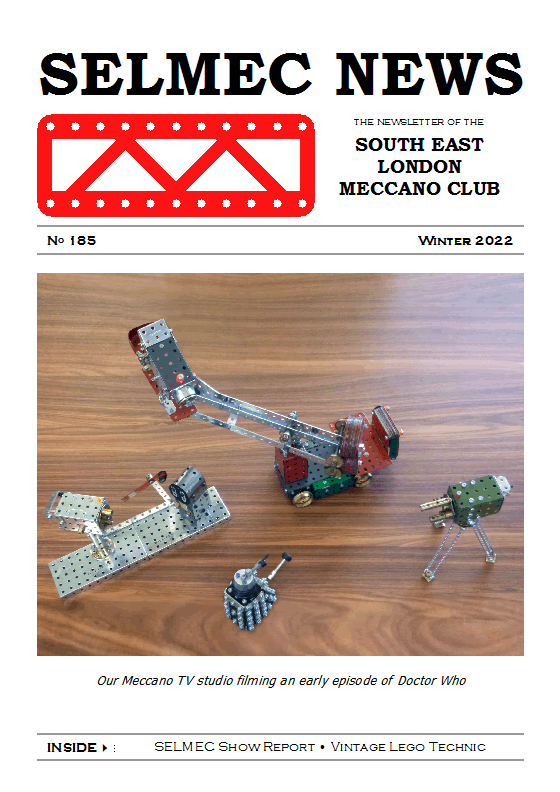
Winter 2022 Newsletter
Issue 185
This was one of our informal quarterly meetings where our members showed off their latest Meccano creations.
At around 2:00pm we had a short committee meeting, followed by the Model Tour in which members were invited to give a short talk about their models — in particular their entries for the Secretary’s Challenge!
At around 3:00pm Alan Wenbourne gave a talk on the subject of Radio Control and Meccano, sharing his experience of using two channel R/C in his models over the last 40 years. This was followed by a demonstration of the system components and their application to Meccano models.
Report written by Tim Surtell
Our second Meccano Show in Falconwood featured a diverse range of models from 15 club exhibitors, filling all of the available space in the hall along with our resident Meccano dealers Ted Muggridge and Brian Maunder.
For the first time in our club’s history we decided to expand the scope of the show, hiring the nursery and conservatory in addition to the hall in order to invite exhibitors with hobbies other than Meccano to participate.
In the nursery the Wealden Valley Railway OO9 gauge model railway layout from the South Eastern Railwaymens’ Model Railway Society dominated the room, and there were displays of model aeroplanes and other miniatures from Welling Model Club along with a table-top Hornby Dublo model railway layout built by Tony Jackson. In the conservatory Bob Vine kept our younger visitors entertained with his ‘A Load of Balls’ exhibit featuring various wacky marble runs.
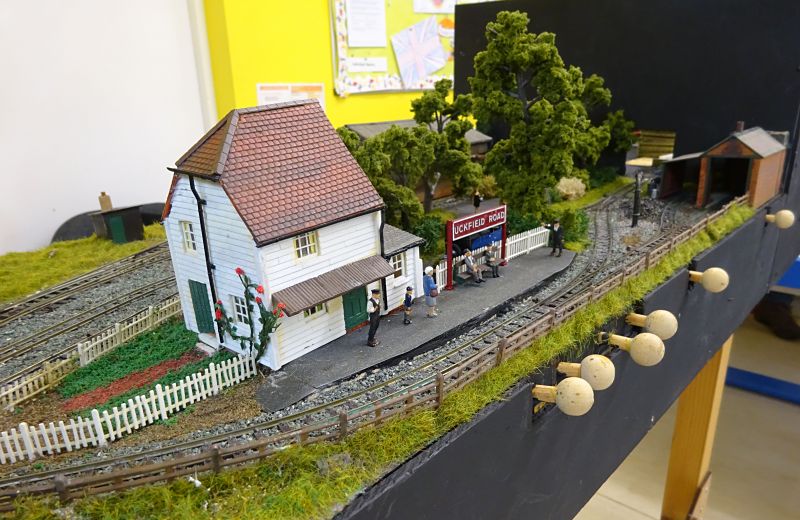
Wealden Valley Railway from the South Eastern Railwaymens’ Model Railway Society
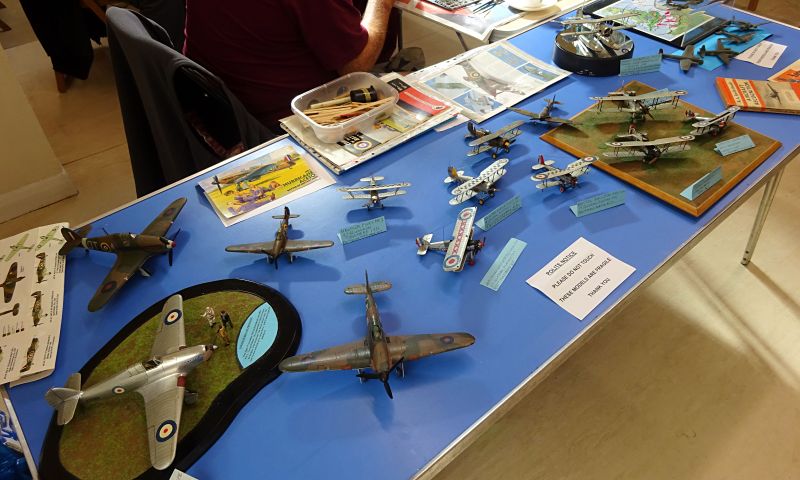
Miniature aeroplanes from Welling Model Club
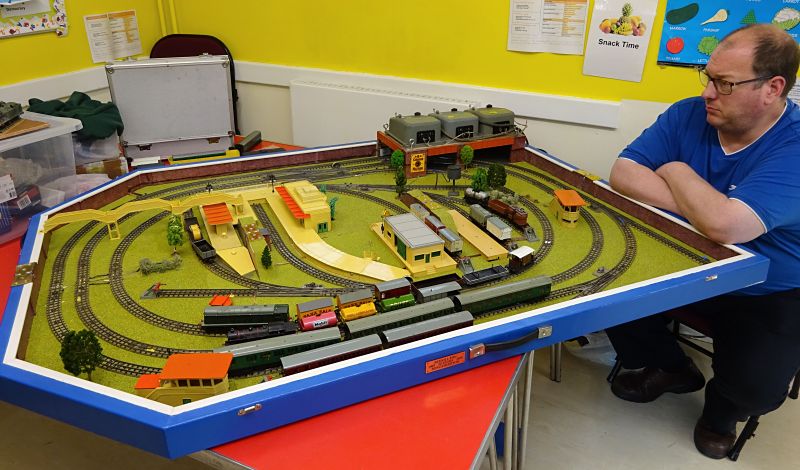
Tony Jackson’s Hornby Dublo model railway layout
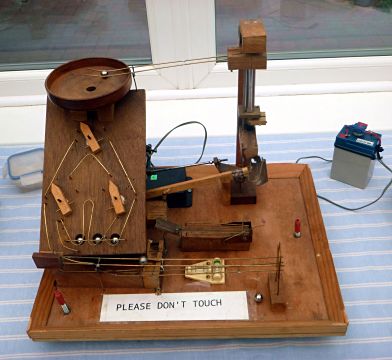
One of Bob Vine’s marble contraptions
Back in the hall we again had a single Make It With Meccano workshop table where children could build models from instructions, and two Meccano Creative Challenge tables bursting with a wide variety of parts that visitors could use to build their entries.
Two members of the same family won prizes this year! Joshua Casselman, 7, won the age 4–7 category with his model tank, while his brother Oscar, 9, won the age 8–13 category with his quad bike model. Serdar Hassan, 41, won the age 14+ category with a lovely little motorcycle which would have made a fantastic entry in our Geoff Carter Cup competition, were he a club member!

Joshua Casselman
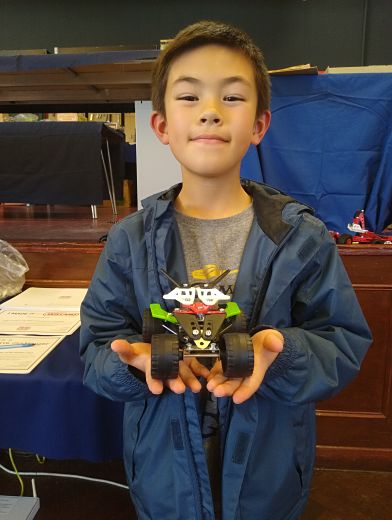
Oscar Casselman
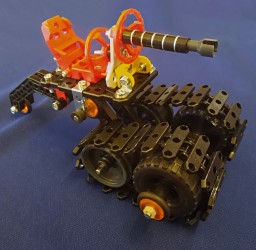
Joshua’s model
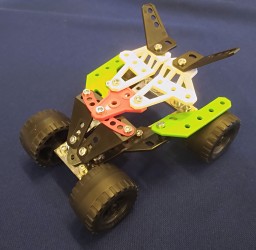
Oscar’s model
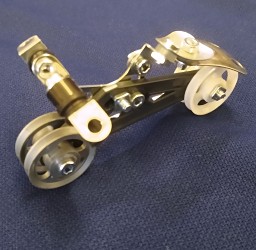
Serdar’s model
You can see all the Meccano Creative Challenge photos in our Facebook album.
Our return this year to in-person publicity at the Eltham Centre paid off, with an increase in visitors to around 250, including 122 children who received free entry.
I’d like to thank everyone for supporting the show by exhibiting and helping to run the pay desk and refreshments. Special thanks go to Cathy Claydon for running the kitchen, Chris Warrell for running the pay desk, Frank Paine for running the raffle, Brian Leach for transport, and to our guest exhibitors and their colleagues: Alan Crouch, Steve Earl, Tony Jackson and Bob Vine.
Models on Display
Brian Leach — Obstacle game; BBC2 ident; Two safes; Coin grabber.
Chris Warrell — Hunslet narrow gauge locomotive; Rogue-Bot; Football game; Battleship; Daleks; TV camera; Two tower cranes; Tunnel boring machine; Wind pump; CLASP station; Fire truck; Dinosaur; Peter Clay’s Meccanograph, Delivery truck; Army troop carrier.
Andrew Couzens — Car transporter; Starship Enterprise; Steering mechanism for car transporter.
Luka Kralj-Taylor — Churchill tank transmission.
Santiago Plicio — The Golden Horizon sailing galleon.
Richard Marsden — Triumph Herald; Road roller; Euclid dumper truck; Racing car; His face! ; Bedford QLD army lorry; Coles mobile crane; Fire engine; Camera crane; Wagon.
Paul Leech (visitor from NELMC) — Mini digger; Gyro car; Bucket excavator.
Nigel Lynn — Fairground gallopers; Showman’s engine; Steam engine.
Greg Clarke — Marion dragline.
Frank Paine — Chair-o-planes; Modern tram; Toy shop display model of Stephenson’s Rocket; № 10 Special Model ‘Schools’ Class locomotive; Twin cylinder steam engine hoist; Toy shop display big wheel; 1916 and 1950s Meccano outfits; Small Aero Constructor plane; Dinky Toys; O gauge Hornby trains; Dinky Builder; Hornby speedboat.
Guy Loveridge — Royal Albert Bridge.
Eric Smith — Mechanical elephant.
John Gay — Leyland fire engine and escape.
Cathy Claydon — USA M3 infantry half track.
Alan Wenbourne — Mars rover; Cletrac tractor; M4 tractor; Gearless right angle drive; 100,000,000:1 gearbox; Churchill tank transmission; Automotive drivetrain; Heatherwick rolling bridge; Two Allwyrm differentials; Computer controlled DSG transmission; Bugatti car; Mercedes car; Veteran car; Morgan aero car; Tugboat.
Tim Surtell — The Lightning Leap and Beat the Goalie games; Spanish Knight; Diabolo player; Treasure chest; Cavorting cow; Unicyclist; Mug; Spider’s web.
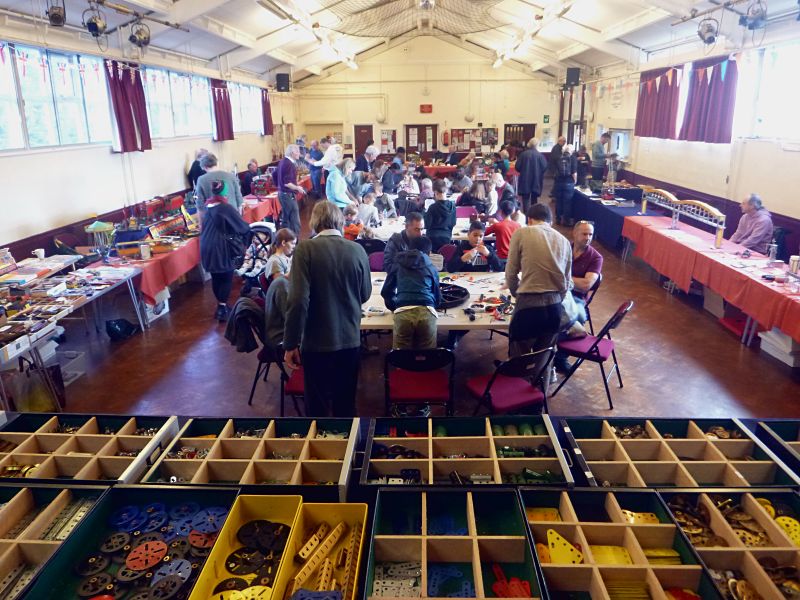
A view of the hall from Ted Muggridge’s stall on the stage
Written by Luka Kralj-Taylor
I would like to take this opportunity to make a shocking confession: I am a fan of Lego. Specifically, I am a fan of Lego Technic produced between 1977 and 1980. In fact, this is what led me to Meccano.
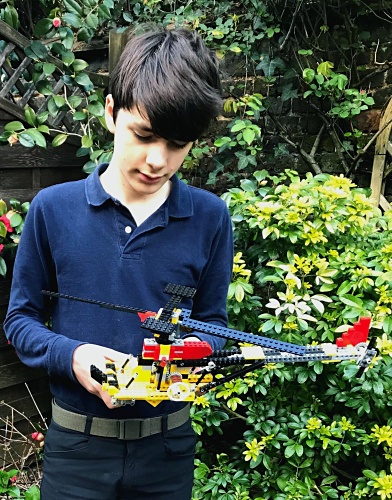
Figure 1 Luka with a Lego helicopter
In this article I will argue that Lego’s older Technic sets inhabit a different and simpler niche and can be used to introduce mechanical principles to children before they are ready for Meccano. However, Technic is widely used today and people don’t seem to progress to Meccano — one quick search on YouTube shows how people are happy to stay with Technic and aspire to make ever larger and more complicated models. There are of course many reasons for this, such as lack of publicity, the inferior flexibility and quality of modern Meccano, and the common belief that anything that is not Lego is somehow ‘copying’ it (the “That’s not Lego!” reaction, something we also suffer from). However, I will mainly focus on one reason, that modern Technic fills the same niche as Meccano (albeit not as well).
First though, a bit of history: Lego introduced the Expert Builder line in 1977 (reference 1), and one of the first models introduced was the Forklift Truck (figure 2; reference 2), with the Go Kart (figures 3 and 4; reference 3) released the following year. These are two good starting sets. This culminated in the Auto Chassis (figures 5 and 6; reference 4) of 1980, by which point the UK Meccano factory at Binns Road in Liverpool had closed own.
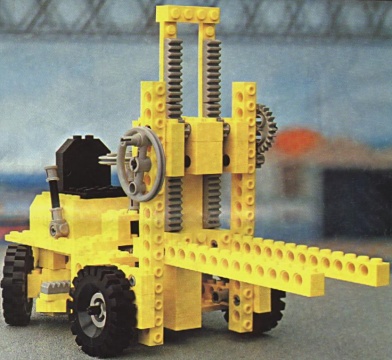
Figure 2 Fortlift Truck

Figure 3 Go Kart
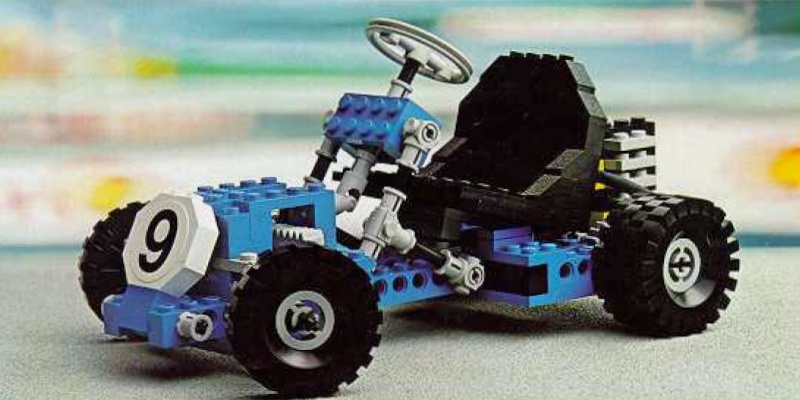
Figure 4 Go Kart
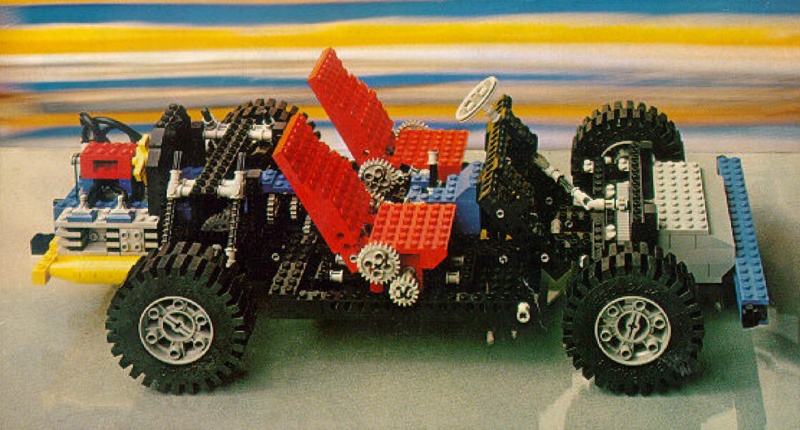
Figure 5 Auto Chassis
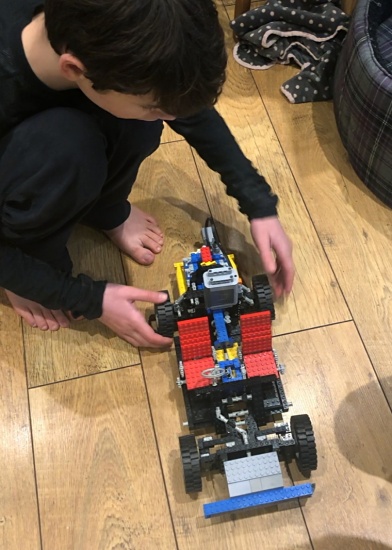
Figure 6 Luka with his Auto Chassis model
Much like Mechanics Made Easy, the Expert Builder name was later replaced by a catchier one, Lego Technic, and the sets started to increase in complexity, thus undermining their central strength: simplicity. In 2000, Lego moved away from parts that were essentially traditional Lego bricks with holes to studless components and from then it effectively became plastic Meccano, losing all the benefits of the original system. This marks the start of a shift away from their original younger audience to a more mature audience. This is exemplified by the Bugatti Chiron set of 2018 (figure 7; reference 5). Unlike the early top-of-the-range car sets this cost £320 and, like Meccano’s № 10 outfit, was far out of the reach of the average child.
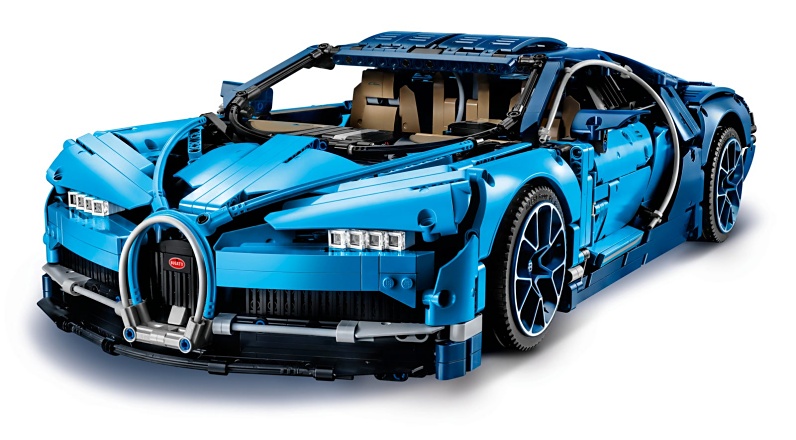
Figure 7 Bugatti Chiron
Early Technic is in many ways more similar to Meccano than the modern sets, as the fundamental idea is to provide the user with parts that can be combined to make mechanical structures that replicate real life. In Meccano one creates parts of the mechanism, then builds a structure that brings them together, whereas in Lego the structure and mechanism are built simultaneously. This, combined with the building block style layering of Lego bricks, can be very intuitive as the builder only needs to focus on one layer at a time since parts effectively only occupy two dimensions. However studs are not very strong and neither are plastics, which means on larger models bracing is sometimes required. This, combined with Lego being harder to dismantle, means that big models are much more complicated and time consuming to make as it takes a long time to change something. Modern Technic is even worse as there are no studs, so one can’t use layering and has to visualise how the whole model will fit together. Dismantling is so much more time consuming and the mechanisms don’t actually reflect real life. This actually means that unlike their Meccano counterparts Lego builders can’t make models better than the sets (a ‘perfect’ model requires a team of people working full-time for years and often involves certain parts being made in colours they had not been made in before). Thus, modern Technic revolves more around producing a model on a box rather than instructing the user on the skills required to produce mechanisms. As such, modern Technic is more similar to Airfix than to Meccano or early Technic.
Ultimately, old Technic should be seen almost as ‘junior Meccano’. This is exemplified by my first experience of mechanical engineering, which came from modern Technic. However I found that building structures with it was so unintuitive that it failed to be educational or satisfying. This led me to my father’s old Technic sets which appealed to me because of their simplicity and versatility, striking a balance between planning and structural integrity. Because I could focus more on the mechanisms I learnt more. However, I eventually reached the limits of the system, and that was when I discovered Meccano. Still, Technic gave me the basic skills required to understand the principles of Meccano. I believe that without first using old Technic, Meccano would’ve been overwhelming for me. Thus, I would encourage you to introduce young potential Meccano enthusiasts to vintage Lego Technic as a gateway to the wonderful world of Meccano.
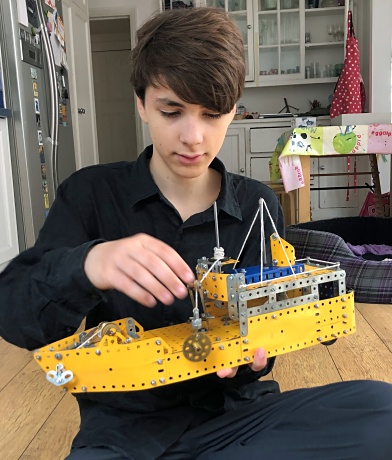
Figure 8 Luka with a Meccano model of a boat
References
- 1977 Lego Technic Catalogue (French and Dutch). Worldbricks, worldbricks. com/en/catalog-year/1970/catalogs-1977. raw? task=download&fid=2831. Accessed 12 October 2022.
- 850 Fortlift Truck Instructions. Worldbricks, worldbricks. com/en/instructions-number/0000/800–899. raw? task=download&fid=269. Accessed 12 October 2022.
- 854 Go Kart Instructions. Worldbricks, worldbricks. com/en/instructions-number/0000/800–899. raw? task=download&fid=273. Accessed 12 October 2022.
- 8860 Auto Chassis Instructions. Worldbricks, worldbricks. com/en/lego-instructions-year/1980/1980. raw? task=download&fid=2679. Accessed 12 October 2022.
- Bugatti Chiron 42083. Lego. www.lego.com/en-gb/product/bugatti-chiron-42083. Accessed 12 October 2022.